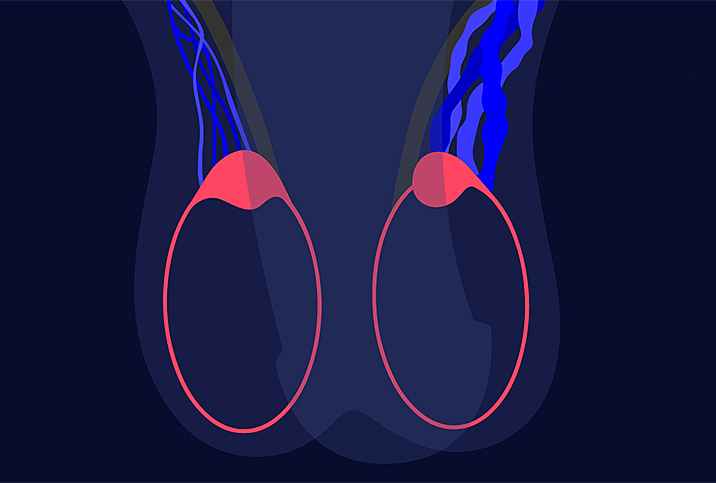Varicoceles and Male Infertility: An Inconclusive Link

Inside the scrotum are veins that provide blood flow to the testicles, and when one of those veins becomes enlarged, it’s called a varicocele. Experienced by roughly 15 percent of men, varicoceles are similar to varicose veins, which are also essentially harmless.
While varicoceles are relatively common, their typical lack of symptoms makes them difficult to detect. Generally, they’re more likely to be found when a doctor is investigating a different reproductive issue, such as infertility.
A varicocele causes the temperature to increase in the scrotum, which must be at least two degrees cooler than the body for proper levels of sperm production. While medical science has an imperfect understanding of the relationship between varicoceles and infertility, it has long been known that elevated testicular temperature kills sperm. Swelling and discomfort in the scrotum sometimes occur, but varicoceles typically have no discernible symptoms, except in cases of infertility.
Ultimately, data point to the possibility that varicoceles can cause infertility, though results are largely inconclusive because of other competing factors, including occupational stresses and personal habits such as smoking and drinking.
Causation inconclusive
A 1992 World Health Organization (WHO) study found reduced testosterone levels in men older than 30 with a varicocele when compared to younger men. This may be due to dysfunction among Leydig cells, which has caused speculation that the low testosterone levels recorded were not due to a varicocele but to primary testicular failure. Furthermore, spontaneous pregnancy occurred as frequently among couples where the man had a varicocele as in situations where this was not the case.
The WHO study did not conclude that varicoceles cause infertility, but stated that they are definitely “associated” with infertility and testicular dysfunction.
Other researchers postulate that a varicocele places oxidative stress on sperm DNA, meaning it upsets the balance between free radicals and antioxidants, and that can cause deterioration. However, since this damage occurs in both fertile and infertile men with varicoceles, it has been concluded that oxidative stress has an adverse effect on sperm but does not necessarily cause infertility.
Ongoing research also is looking into how a varicocele affects sperm parameters, which may gradually deteriorate. However, it has been found that semen parameters among both infertile and fertile men with the condition are about the same as in men who do not have varicoceles.
So, while many researchers believe varicoceles can cause infertility in men, there is still widespread uncertainty as to how, exactly, this occurs. Some scientists have simply decided that varicoceles impact sperm health in some men but not in all, which is little help to those who have questions about treatment and conception.
Treatments for varicoceles
Fortunately, several treatment options for varicoceles can resolve related fertility problems.
One option is to close off or sever the affected vein through minimally invasive surgery, thus redirecting blood flow to healthy veins. Doctors can also block the varicocele through medication or by embolization, a procedure that releases small metal coils into the vein through a catheter, causing a blood clot to form and close off the vein.
Microsurgical repair can help reduce sperm DNA fragmentation, improve sperm parameters and boost pregnancy rates. With microscopes making it possible to locate and treat tiny testicular arteries, the procedure can result in enhanced sperm-cell generation in men who have null or low sperm counts. In many cases, testosterone levels also improve, increasing virility and leading to more robust bone and muscle health.
Despite widespread uncertainty about the relationship between varicoceles and infertility, it is a factor that must be accounted for when considering treatment.

















